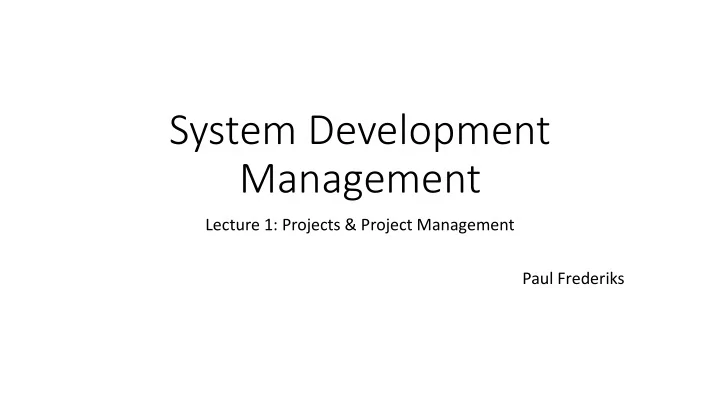

System Development Management Lecture 1: Projects & Project Management Paul Frederiks
What is a project? (1) • Definition 1: A project is a temporary, result-oriented cooperation between people using scarce resources. • Definition 2: A project is a sequence of coherent activities which: - deliver a concrete and well-defined result; - have a well-defined start and end date; - should be realised within restricting prerequisites; - have one client who wants the result and is committed tot it. Furthermore, contains unique elements, require multiple disciplines and departments and contains some risks and uncertainty that the project result will not be obtained.
What is a project? (2) € Devils Triangle R Q T
What is a project? (3) • Definition 3: A project is a temporary organization which is required to obtain a unique, predefined product or result within predefined timeliness using predefined resources. • Definition 4 (PRINCE2): A project is a defined as a management environment with the objective to deliver one or more products as defined in the Business Case (= justification project, costs and benefits)
Why Project Management and Project-based Way of Working? • Project management and project-based way of working is required in case a routinely way of working is not possible nor improvisation is desirable. • Project-based way of working is characterized by 4 principles: 1. First thinking, than doing. What are the risks? 2. Systematic working, making and execution according to plan. 3. Agreed is agreed; everybody depend on each other in a project. 4. Result-oriented way of working; deliver the agreed project result.
Why do projects fail? • It is not clear and explicit who the client is. • No (good) project plan. • No well-defined project result. What is in scope and what is out scope? • Bad planning of resources and activities. • Changing requirements and changing starting points. • Lacking project control on the project progress such that problems in the project are recognized too late to recover. • Insufficient measure points and decision points. • Lacking project quality. • Insufficient time allocation of the project participants. • No or poor business case. • Communication
Principles of project management (1) • Separate project management and project execution. • Requires separation skills of project manager; • Focus of project manager should not only be on the project execution but also on the environment (see next slide). • Separate / Split the project management process: 1. Project start: Assigning the project manager 2. Project execution: • project preparation (project plan) • management of project execution 3. Project closing: • acceptance of project result • project evaluation • dismissal of project manager
Principles of project management (2) • Manage and control the environment • Board of Management • Supplier • Line management • Financial partners Contract • Staff • Organization Consultants Partners • Users • PM Unions Project Team
Principles of project management (3) • Structure and use a model for project execution • Models: Waterfall, Agile techniques • Distinguish phases, go/no go moments • Define milestones • Control the execution: quality (functionality), time, € , project organization, information, resources, communication • Distinguish roles (see next slides)
Board of Management Steering Committee Senior User Executive Senior Supplier Quality Project Manager Project Office Project team
Roles in project management organization (1) • Executive: • Accountable for the project result • Owner of the business case • Proportions the interests of the business, users and supplier • Sr. User: • Represents the user who will use the project result • Responsible for delivering user requirements • Responsible that project result full fills requirements • Sr. Supplier: • Delivers required resources • Responsible for the quality of project result • Ensures project result is according to agreed standard • Judges whether project results can be delivered in time within budget
Roles in project management organization (2) • Project Manager: • Responsible for delivering the agreed project results within agreed quality, timeline and budget • Ensures project result will full fill business case • Manages project within agreed boundaries • Project Team: Project Execution and delivery of products • Project Office: • Administrative and secretarial work • Document and version control • Project progress reporting
Roles in project management organization (3) • Quality Officer • Quality assurance independent of Project Manager: • Business case • Correct standards • Connections with user requirements • Usage of right project resources • Scope
Project Plan: sample table of content 1. Objective of this document: contract project manager and steering committee 2. Impact of project proposal (on processes, systems, security) and prerequisites 3. Financial budget (HW, SW, Training, Consultancy, Hours (including internal hours for backfill)) 4. Project planning: products, project breakdown structure, timelines, dependencies 5. Project organization (roles and names): make sure people are available and willing to participate before project plan is discussed in steering committee 6. Project controls: tolerance, reports, information matrix 7. Project Risks: Risk mgmt., Issue mgmt., change and escalation procedure => More about project controls and project risks next lecture!
Purpose of project plan • Consciousness • Documentation and registration of agreements • Communication
Guidelines to prepare a project plan • Work iterative • Work together • Work from abstract / high level to more details • Work forwards and backwards through your document • Specific: What, Why, Who, Where, … • Measurable: How much, How many, … • Achievable: Quality, Time, € (do-able) • Relevant: Project result is desired by customer • Time-bound: When
Literature • Praktisch Projectmanagement 1 – Ten Gevers & Tjerk Zijlstra (in Dutch) • Projectmatig werken – Gert Wijnen, Willem Renes & Peter Storm (in Dutch) • PRINCE2 voor opdrachtgevers – Michiel van der Molen (in Dutch) • De kleine Prince 2 – Mark van Onna & Ans Koning (in Dutch) • … but there is much more on this subject on the internet (also in English)
Recommend
More recommend